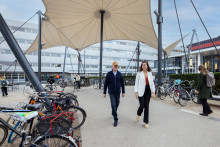Jan van den Hoogen is an organization-expert, trainer and experience expert at Arbo Unie. He will lead several workshops related to mental resilience during the Well-being Weeks, which also include lectures and workshops on the topic of energy bills, money and solar panels.
In your professional experience, how much does the current inflation and energy crisis impact people’s well-being?
Van den Hoogen: ‘Nowadays many people have financial problems due to the inflation and the energy crisis. Staying awake at night, worrying about your energy bills, is one of the most demanding and most common stressors nowadays. It has become an existential problem for many. People wonder: can I survive this? How can I provide for my family? These are huge stressors that impact your home life but also your abilities as a professional. That’s why I will be giving several workshops about mental resilience. In order to stay mentally resilient, it’s important for people to be aware of their stressors but also to stay in touch with their energy sources. Do things that give you energy instead of things that take away your energy.’
Have you seen an increase in complaints related to this topic? Is it currently the most common issue affecting people?
‘There are no precise numbers available at the moment, but I’d estimate that 50% of Dutch households have financial difficulties. This is not something people are proud of, and they therefore don’t talk about it. People are not open about discussing these problems. It’s a secret they carry with them. People are afraid. Either they fear because they cannot pay the bills or they fear that it might happen – because they hear it everywhere and it is happening to so many people. That’s why it is really good that the UT has set up a system to help. For example, they have provided a phone number where people can call and get advice. I think that is a really good step.’
Do these issues impact people’s mental health or also physical health?
‘Mental and physical health are connected. If you are under mental strain, it will affect your physical health. A simple example is: if you don’t get enough sleep, you can’t function during the daytime. Sleep and relaxation are one of the most important energy sources. On top of lack of sleep and relaxation, people often experience irritation and they are not able to cope with situations they’d otherwise handle.’
well-being weeks
‘Our goal is to help people with worries that they have at the moment,’ says Ines Brüninghoff, Work, Organization and Health Psychologist at the UT and one of the main organisers of the Well-being Weeks. ‘Based on the societal developments, we decided to add many workshops related to financial fitness. And so while the previous edition focused more on hybrid working and work-life balance, this edition is much more practical and focused on energy bills, heating, tips on how to save money.’
The financial workshops are the most popular part of the programme so far, adds Brüninghoff. ‘Many of them were booked very fast, and so we even added waiting lists. I am also happy that, as expected, some of the lunch walks were also fully booked rather quickly. That shows us that finances are a big topic, but that people also feel the need to get together and have a break.’
The organisers expect more participants than in the previous editions of Well-being Weeks. ‘Last year we had the total of 600-800 participants, we are now already at more than 600 participants. And we expect this number to grow,’ says Brüninghoff. ‘It’s nice to see that people are enthusiastic. People also reach out to us to ask if their activities can be included in the programme. Together with the broader scope of programme, this is evidence of the bigger well-being movement. Everyone is more focused on the topic now. We see more participation from within the organization and that is something we can be proud of as the UT.’
What can people do to minimize the impact? How can they safeguard their well-being?
‘The most important thing is to reach out and talk about it. Talk about it with your family, but also with your colleagues and your employer. Don’t be afraid to ask for support. Don’t be a hero. Don’t try to do it all alone and seek the help you need.
In my workshops, I’ll focus on what you should do if you feel like you are running out of energy sources. You should focus on what you’re in control of, not too much on the stressors. You should make the decision to focus on your energy sources. Your energy sources can be anything – reading a book, meeting new people… anything.’
What if you simply don’t have time to do that?
‘That is exactly the point: You always have that possibility. Which is why the theme of this edition of Well-being Weeks ‘Take the lead’ is fitting. The issue is that in time of crisis, you only focus on things that you have to do, you forget the things that you enjoy and that give you energy. You can’t get rid of your stressors, but you can spend so much time on your energy sources that you won’t have time to focus on stress. It’s your choice what you spend time on. Spend time on the things that you need to get energy, and therefore to cope with the things that are stressful.’







